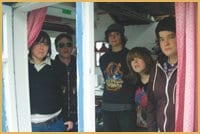If there ever was a competition to declare the title of “Official House Band of Strathcona,” Better Friends Than Lovers would likely win the prize.
The five-piece group is all heart and harmonies on its full-length debut release Great Loves, and the group’s dedicated, East Van-heavy fan base will recognize most of the songs from the frequent live shows they have played around town. They’ve opened for everyone from Amy Ray (of Indigo Girls fame) to Swan Island to Lesbians on Ecstasy.
The group, which formed in 2004, is four-fifths queer, save for co-vocalist Jeremy Pelland. Together in their current lineup for two years now, the five are about to embark on their first-ever six-week cross-Canada tour. The topic of surviving together on the road soon comes up, provoking a mixture of laughs and mock trepidation. I ask them if they plan to have beltnotch competitions to see who an get the most action on tour. Guitarist Mandy Hardwick jokingly demurs.
“I don’t believe there’s going to be time for that kind of behaviour. We’ll be watching porn on our Ipods…I enjoy fag porn and leather porn,” she laughs.
True to their name, the group collectively asserts that temptation in the form of intra-band intimate relations is simply not an option —on or off the road. “None of us have been or will be lovers; that is our policy,” affirms Hardwick. “As bandmates, we don’t enter into relationships with each other.”
Even as the bandmates’ excitement about the tour builds, they are aware that sexism and homophobia are facts of life on the club circuit.
“We’ve run into countless problems with people being sexist, people trying to rip us off, that kinda stuff,” co-vocalist Eli Leary reveals. “A lot of bars are total ‘dude bars’: you have to prove yourself ’cause you’re a girl, and you also have to prove yourself ’cause you’re gay. I feel like there’s a lot of homophobia in the industry across the board.”
Given the level of political activism among the band members —from being in the Under The Volcano collective to performing at shows like Rock For Choice —it might come as a surprise that the group’s new disc is not politically driven lyrically. Instead, it’s filled with a host of indie rock love- and love-gone-wrong songs.
“The album, the music, the lyrics don’t have to scream ‘politics, politics’ but everything in here is ‘the personal is political,'” drummer Laura Hatfield explains. “If anyone wanted to actually talk about those politics, we’d be happy to share.”
One of the ways the group shows its politics is simply through its choice of community. The bulk of the band lives in Strathcona and is fiercely devoted to that neighbourhood and the politics that draw many Strathcona queers together.
The members don’t just live there; they live collectively, they play shows and house parties there (most notably the ‘Hawkes House’ a communal-style home to many a charming night of music and entertainment) and they feel a kinship towards their neighbours.
“When I first found that little neighbourhood, Strathcona, I was fucking blown away,” recalls Leary. “I was walking around with a glass of red wine in my PJs, going from house to house, and visiting radical queers who later became my best friends.
“I remember the first time seeing the Hawkes House; I saw my friend Scout —a total radical punk kid —playing accordion and there were can-can ladies lined up dancing. I love this place!
“We’re pretty much the last renters on the block; we’re known as the eccentric house that has the house parties.,” Leary continues. “It is a really safe spot, we trust each other deeply, we pet-sit for each other, we babysit for each other’s children, it is like a family. That is the difference,” Leary points out. “I’ve lived on the Drive and it is too big to be a family, I think.”
Hardwick is more direct in her disdain for Vancouver’s better-known and more heavily populated dyke neighbourhood.
“I live on Commercial Dr right now and I fucking hate it,” she says with unequivocal candour. “I’m moving back to Strathcona because there is absolutely no community on Commercial Dr anymore and it pisses me off.
“Like anywhere that artists come in and take over an environment, it gets gentrified. That is the process. The only thing that makes it special in my eyes is that some of us are still able to live there and can still afford housing. Otherwise, if we couldn’t, there would be some other special place.”

 Why you can trust Xtra
Why you can trust Xtra


